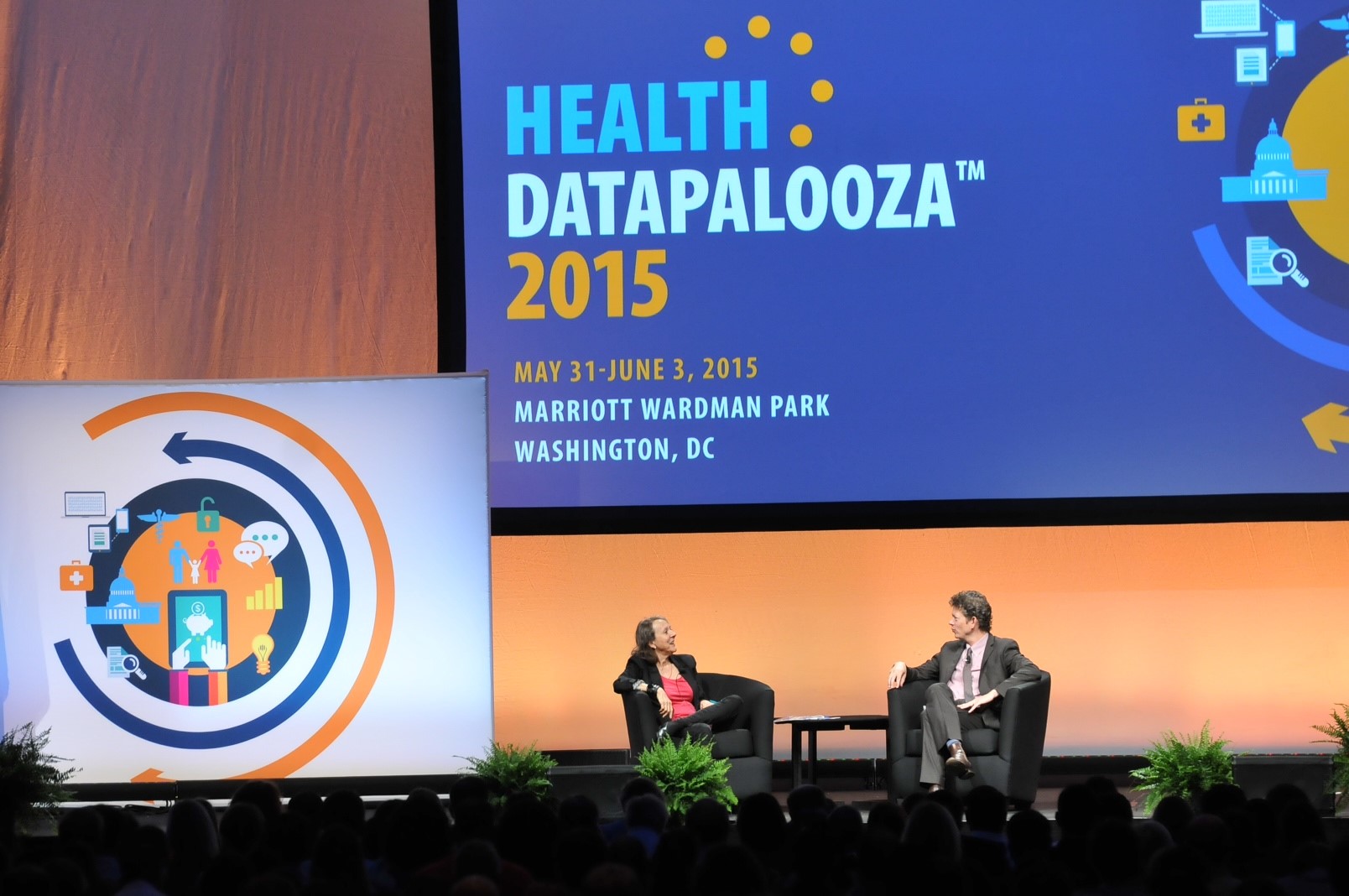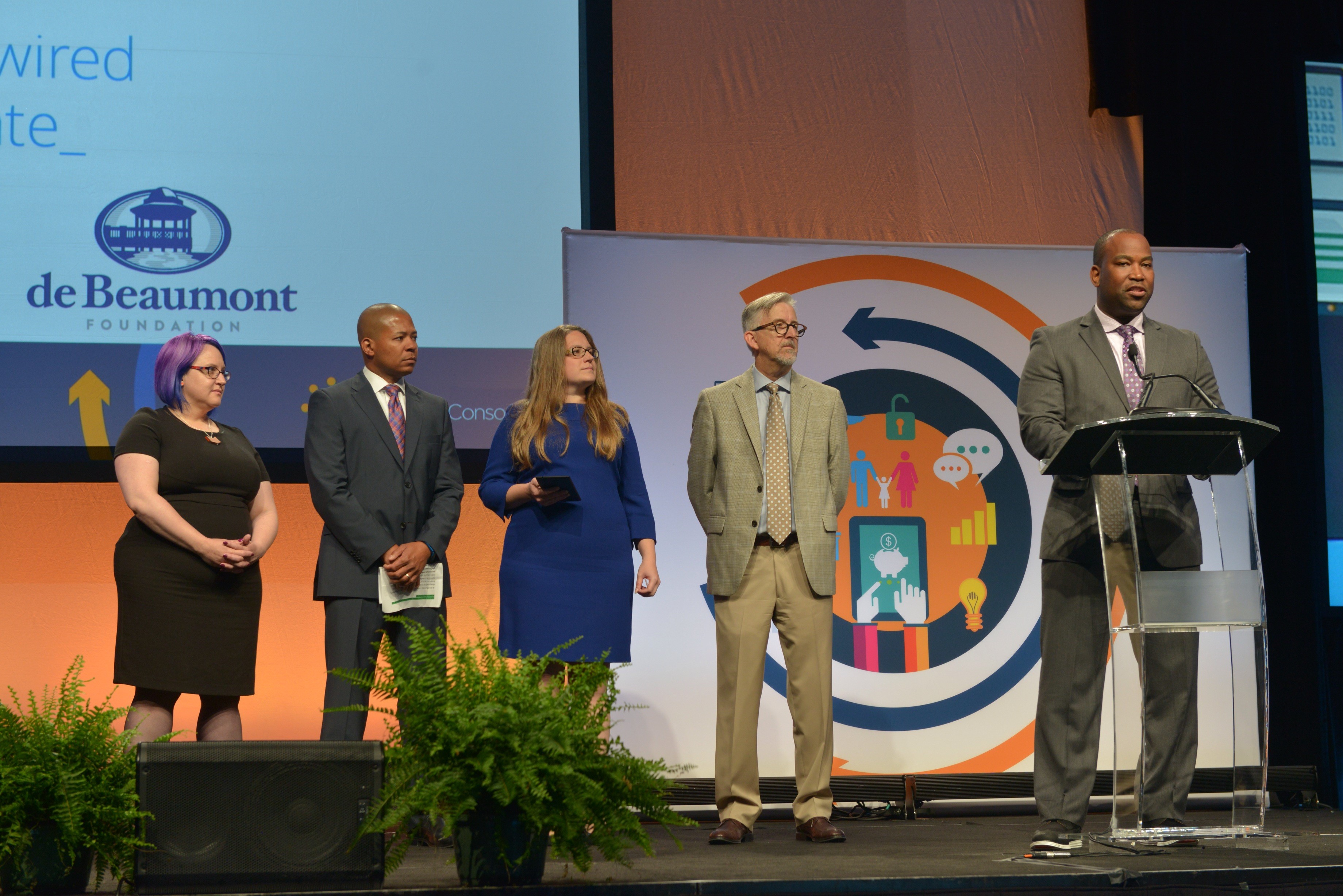
Five years ago, people asked what would happen if we brought together developers, startups, entrepreneurs, policymakers, and industry leaders together around a common goal of open health data. The result was the first Health Datapalooza, which attracted about 45 people. This week, the sixth Health Datapalooza is bringing together more than 2,000 participants for four days of events demonstrating new, diverse health innovations that are made possible by collaboration around open data.

Fireside chat with Esther Dyson and Thomas Goetz at this year's Health Datapalooza. (Photo credit: Health Data Consortium).
We’re on the precipice of a dramatic democratization of health data access. The mission of the U.S. Chief Data Scientist and team is to responsibly unleash the power of data for the benefit of the American public and maximize the nation's return of its investment on data. Data is one of the most effective mechanisms to empower and activate citizens to become true partners in their own care team. This year’s Health Datapalooza highlights many promising stories of patients generating data from non-traditional sources like wearable technologies, environmental sensors, and social media to create a more complete picture of their health.
In the past, someone with diabetes might have to drive three hours to their endocrinologist to deliver their blood glucose readings in person. It’s now possible for the data to flow automatically from the patient’s blood glucose monitor, through a linked mobile app, and into the patient’s electronic health record at his or her physician’s office. The physician can in turn examine the data and securely email the patient with his or her analysis and recommendations. This quick and simple process can deliver huge benefits to both patient and care provider.
The annual Health Datapalooza has also catalyzed partnerships on an international scale. Sparked by a conversation between President Obama and Prime Minister Cameron in 2011, the UK sent over its first delegation of startups to Datapalooza, and the partnership ultimately evolved into a joint UK-U.S. Memorandum of Understanding (MOU) to support early stage companies as they launch products across the pond. On Monday, June 1, a year into working together under the MOU, the first UK-U.S. Challenge organized as part of this MOU was announced: the Obesity Data Challenge, a prize-based competition running in the U.S. and the UK that seeks the development of innovative uses of open data around adult obesity. Countries including Canada, India, and Brazil were also represented at this year’s Datapalooza, providing an exciting chance for more future cooperation.

The U.S. Department of Health and Human Services and National Health Service England announce the first joint UK-U.S. Obesity Data Challenge. (Photo credit: Health Data Consortium)
Here in the U.S., we’re driving the shift toward value-based care across the health care system. Improving the quality and quantity of health data supports this shift by helping patients and care providers make better-informed health care choices, creating opportunities for data providers while leading to both health and financial benefits for data users. As a result we’re seeing major consumer technology companies enter the health data space, setting the stage for a massive change in how people get access to their health information and what they can now do with it.
This week’s Health Datapalooza showcased just a few of those changes: Advances in technology have reduced the price of consumer genetic testing. Citizen science organizations are tying together disparate datasets to create a layered understanding of how environmental factors impact disease. Telemedicine is allowing individuals to receive basic care in retail pharmacies. Industry is coming together around emerging data standards, such as Fast Healthcare Interoperability Resources (FHIR), which is being tested at the Federal government’s Centers for Medicare & Medicaid Services to help provide consumers access to their Medicare data. Individuals could also use these standards to contribute their data for research efforts, including the President’s Precision Medicine Initiative.
We’re seeing innovation like this take hold across the United States. That’s why we want to hear from YOU! Let us know what you are doing to advance health outcomes and ensure that health care fits seamlessly with an individual’s lifestyle and a physician’s workflow, without compromising the quality or security of care.
Join us for a Twitter Q&A at 2 pm ET today where we’ll be answering your questions on the ways that government is working to bring new data and ideas to health care. Just tweet @DJ44 using the hashtag #AskDJ.
Efficient and effective health care solutions are closer than we think – and we look forward to working together to get there.
DJ Patil is Deputy Chief Technology Officer for Data Policy and Chief Data Scientist at the White House Office of Science and Technology Policy.
Maya Uppaluru is Health IT Liaison at the White House Office of Science and Technology Policy.

